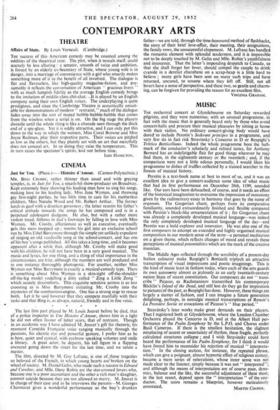CINEMA
Just for You. (Plaza.) Histoire d'Amour. (Cameo-Polytechnic.) MR. BING CROSBY, rather thinner than usual and with greying temples, is, in Just for You, a smash-hit show-producer on Broadway. Kept extremely busy showing his leading man how to sing his songs, making love to his leading lady, Miss Jane Wyman, and throwing gay first-night parties, he has little time to care for his motherless children, Miss Natalie Wood and Mr. Robert Arthur. The former lands in gaol with a drunken governess ; the latter resents his father's critical attitude towards the songs he has composed and is in a perpetual adolescent dudgeon. He also, but with a rather more violent tread, follows in dad's footsteps by falling in love with Miss Wyman. Mr. Crosby, affectionate as well as executive, eventually gets this mess mopped up ; worms his girl into an exclusive school run by Miss Ethel Barrymore through the simple yet unlikely expedient of singing an old vaudeville song at the school-concert, and has one of his boy's songs published. All this takes a long time, and it becomes apparent after a while that, although Mr. Crosby will make good with his children, he will not have been in a very good musical. The music and lyrics, for one thing, and a thing of vital importance in the circumstances, are trite, although the numbers are well produced and in one instance thoroughly photogenic. For another, neither Miss Wyman nor Miss Barrymore is exactly a musical-comedy type. There is something about Miss Wyman in a skin-tight off-the-shoulder off-the-leg model yodelling a ditty called " Zing a Little Zong " which acutely discomforts. This exquisite sensitive actress is as lost crooning as is Miss Barrymore initiating Mr. Crosby into the mysteries of the combustion-engine. One has a strong urge to rescue both. Let it be said however that they compete manfully with their tasks and that Bing is, as always, natural, friendly and in fine voice.
s The last film part played by M. Louis Jouvet before he died, that of a police inspector in Une Histoire d'Amour, shows him in a light he did not often favour of latter years, that of restraint. Though in an academic way I have admired M. Jouvet's gift for rhetoric, his resonant Comedic Frangaise voice ranging musically through the passions, his electric eye and powerful gesture, I prefer him as he is here, quiet and cynical, with eyebrow speaking volumes and smile a library. A great actor, he departs, his tall figure in a flapping overcoat going down the street for the last time, and we salute a master.
The film, directed by M. Guy Lefranc, is one of those tragedies so beloved of the French, in which young hearts are broken on the wheel of society. M. Daniel Gelin, who made such a success in Edward and Caroline, and Mlle. Dany Robin are the star-crossed lovers who, because one is a poor accountant and the other a rich man's daughter, commit suicide because they are not allowed to marry. M. Jouvet is in charge of their case and as he interviews the parents—M. Georges Charmarat gives a wonderful performance as the boy's drunken father—we are told, through the time-honoured method of flashbacks, the story of their brief love-affair, their meeting, their assignations, the family rows, the unsuccessful elopement. M. Lefranc has handled the romantic element with splendid tenderness, and it is impossible not to be deeply touched by M. Gelin and Mlle. Robin's youthfulness and innocence. That the latter's impending despatch to Canada, so that she shall forget her lover, should compel the couple to drink cyanide in a derelict charabanc on a scrap-heap is a little hard to believe ; many girls have been• sent on many such trips and have returned, uncured, to resume where they left off. Still, not all loveri have a sense of perspective, and these two, so gentle and charm- ing, can be forgiven for providing the reason for an excellent film.
VIRGINIA GRAHAM.


































 Previous page
Previous page